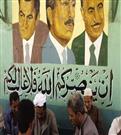|
|
||||
|
|
by Donald Levit  With no plans for what was to come afterwards, Arab Spring uprisings in Syria, Libya and Yemen replaced bad regimes with chaos, and the jury is still out on Tunisia. Most familiar to foreigners, however, and poster boy for millennia of alternating domestic and foreign despots and current factionalism and instability, is Egypt. Like The Square, some try to make sense of its complications from “the bottom up,” the point of view of those in the street, said writer-director-coproducer Jihan El-Tahri at the 23rd New York African Film Festival screening of her triptych Egypt’s Modern Pharaohs/Les Pharaons de L;Eygpte Moderne. Instead, her eleven-country coproduction looks “from the top down,” neither from the usual foreign perspective nor from known history but rather concentrates on those three figures who made the decisions and the history of six decades. Historian Hugh Trevor-Roper noted that “there is only the history of Europeans in Africa. The rest is darkness.” Thus the films’ three necessary hours of also additional names unfamiliar to outsiders, of strikes and counter-strikes and movements and counter-movements, archival footage and clips from national films illustrative of emotions at their time -- e.g., Chaos, A Bullet Remains in My Pocket, The Terrorist -- repeated interviews with partakers and politicians, red boldface newspaper headlines, and an overwhelming cast of sometimes acronymic interest groups. At Maysles Cinema, Lincoln Center and BAMcinématek the NYAFF offers over fifty works on this golden anniversary of Ousmane Sembène’s Cannes milestone Black Girl, and even though El-Tahri insisted “there’s always hope, that’s why I make films,” this her newest (recently at the Toronto International Film Festival) and indeed her entire astounding filmography do not inspire optimism about the continent, north or south of the desert. There is such richness of facts, names and events unfamiliar to most audiences that even in these truncated versions, viewers will have difficulty digesting it all. The BBC three-part showing, as a documentary mini-series, must have been easier on the comprehension, not to mention on the backside. But, as with the shotgun method of opening a zillion coffee shops or convenience drugstores knowing only some will survive, enough resonates and sticks to give a general idea -- and to frighten. Among unifying central threads are Egyptians’ immemorial reverence for the strongman ruler and for Deity -- “the minute you say God, Egyptians shut up and accept” -- and intolerance of others easily tarred and targeted as “infidels”; socialism as against consumer capitalism, riches at the top vs. destitution for the vast majority; tradition contrasted with modernism, and religious and political extremism. The triumvirate power brokers whose successive careers and abrupt falls ring familiar for various reasons, are each given a more or less fifty-minute section or separate film. First is Gamal Abdel Nasser, of the so-called Free Officers who ousted King Farouk; who parallel to Franco in Spain bested a military rival, Muhammad Naguib; and who became prime minister and beloved multi-term president and de facto dictator. Ambitious economic, social and educational policies included the High Aswan Dam, while he emerged as a rallying point of pan-Arab and -African pride despite disastrous wars against Israel. So popular that the people rejected his calculated resignation after the 1967 Sinai campaign while “dawn visitors” eliminated opposition to “behind the sun,” he was moving to rapprochement with the Soviet Union when he died unexpectedly at fifty-two, a natural death according to the filmmaker’s research. In Part II, Anwar al-Sadat succeeds as “The Pious President,” appears in uniform in contrast to his predecessor’s presidential mufti but purges officers loyal to that previous regime, forcibly strengthens his hand through disappearances and mass detentions in Tora prison, and seeks to end the long conflict with the Jewish state by paradoxically entering upon another losing war against it. Hence, the Camp David Accords and his 1977 speech before the Knesset as means to stanch the bleeding national economy, together with infitah, or opening, to attract foreign capital. This played out against an alphabet soup of irreconcilable internal groups secular and religious, legal and outlawed, political, military, civilian, educational, mainstream, fringe and fanatic, of which the most widely recognizable is the Moslem Brotherhood. Truly, outsiders will be more puzzled than the Egyptians in their fog. Turmoil and near civil war in the country today stem from its past, which the director is frank about wishing to show; but unequivocal assertions that, for example, Osama bin Laden and Al Qaeda result from Brotherhood spokesmen-martyrs such as Sayed Qotb are not truly borne out in what is here. Whatever the truth, radical Islam grew in strength, and when army extremists assassinated Sadat reviewing a parade in 1981, Vice President Hosni Mubarak was splattered with blood but unharmed. In Part III, under the continued state of emergency during his five presidential terms as the country’s longest-serving head since 1848, corruption coupled with nepotism hamstrung the ninety-nine-percent destitute while privatization of industry was further enriching the small, fabulously wealthy elite. In order to attract attention outside, radical groups stepped up attacks on foreign tourists as well as native Christians, resulting in thousands of panicked arrests. Circulated on social media, street protests still were not able to force Mubarak’s resignation until 2011, even though a court found him not guilty of corruption, abuse of power and ordering the killing of protesters. [Successor Abdel Fattah el-Sisi’s government at present keeps him in not-onerous house arrest in Maadi Military Hospital, while in effect selling pardons to his enriched cronies.] France’s revolutionary slogan is the most famous, but Egypt’s Bread, Freedom and Social Justice rings as catchy. No summary sketch of these three films can give an adequate idea of the achievement that is EMP, nor could any film(s) expect to explain these six decades that are still failing to find resolution. But this enthralling overview is as good as one can hope for. |
||
|
© 2025 - ReelTalk Movie Reviews Website designed by Dot Pitch Studios, LLC |



